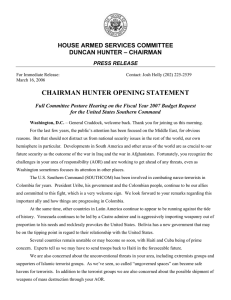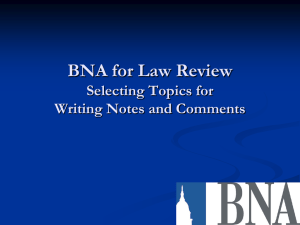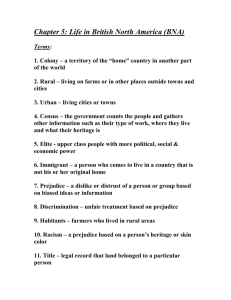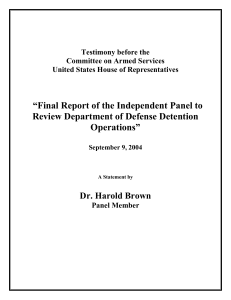Document 11252491
advertisement
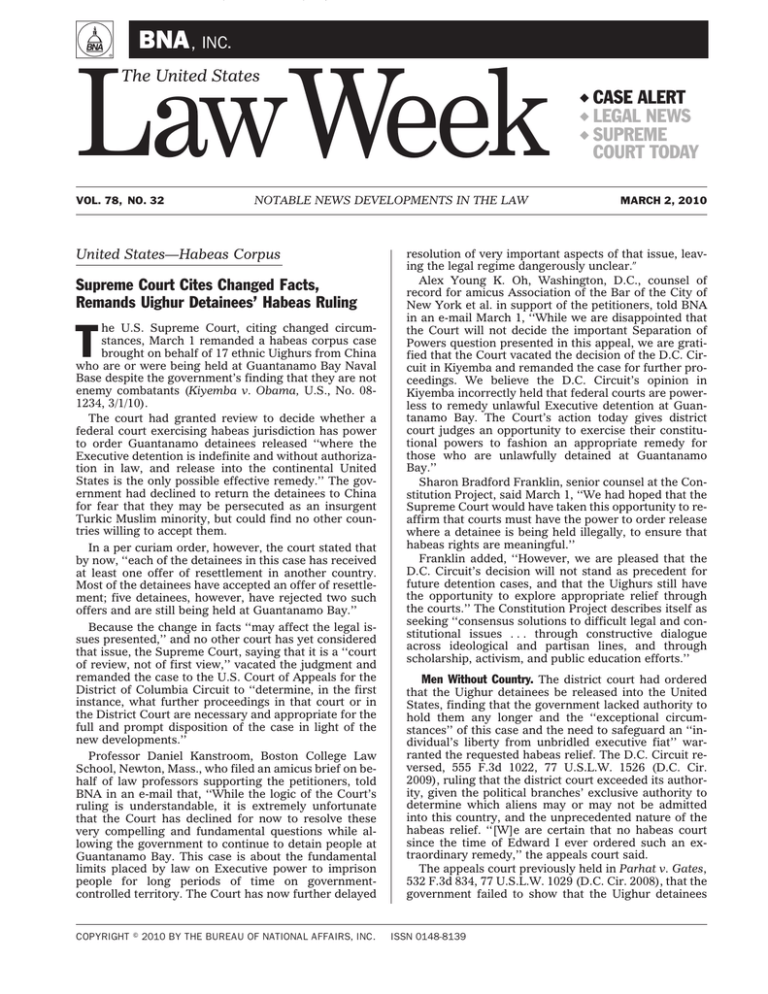
A BNA , INC. Law Week The United States VOL. 78, NO. 32 NOTABLE NEWS DEVELOPMENTS IN THE LAW United States—Habeas Corpus Supreme Court Cites Changed Facts, Remands Uighur Detainees’ Habeas Ruling he U.S. Supreme Court, citing changed circumstances, March 1 remanded a habeas corpus case brought on behalf of 17 ethnic Uighurs from China who are or were being held at Guantanamo Bay Naval Base despite the government’s finding that they are not enemy combatants (Kiyemba v. Obama, U.S., No. 081234, 3/1/10). The court had granted review to decide whether a federal court exercising habeas jurisdiction has power to order Guantanamo detainees released ‘‘where the Executive detention is indefinite and without authorization in law, and release into the continental United States is the only possible effective remedy.’’ The government had declined to return the detainees to China for fear that they may be persecuted as an insurgent Turkic Muslim minority, but could find no other countries willing to accept them. In a per curiam order, however, the court stated that by now, ‘‘each of the detainees in this case has received at least one offer of resettlement in another country. Most of the detainees have accepted an offer of resettlement; five detainees, however, have rejected two such offers and are still being held at Guantanamo Bay.’’ Because the change in facts ‘‘may affect the legal issues presented,’’ and no other court has yet considered that issue, the Supreme Court, saying that it is a ‘‘court of review, not of first view,’’ vacated the judgment and remanded the case to the U.S. Court of Appeals for the District of Columbia Circuit to ‘‘determine, in the first instance, what further proceedings in that court or in the District Court are necessary and appropriate for the full and prompt disposition of the case in light of the new developments.’’ Professor Daniel Kanstroom, Boston College Law School, Newton, Mass., who filed an amicus brief on behalf of law professors supporting the petitioners, told BNA in an e-mail that, ‘‘While the logic of the Court’s ruling is understandable, it is extremely unfortunate that the Court has declined for now to resolve these very compelling and fundamental questions while allowing the government to continue to detain people at Guantanamo Bay. This case is about the fundamental limits placed by law on Executive power to imprison people for long periods of time on governmentcontrolled territory. The Court has now further delayed T COPYRIGHT 姝 2010 BY THE BUREAU OF NATIONAL AFFAIRS, INC. ◆ ◆ ◆ CASE ALERT LEGAL NEWS SUPREME COURT TODAY MARCH 2, 2010 resolution of very important aspects of that issue, leaving the legal regime dangerously unclear.⬙ Alex Young K. Oh, Washington, D.C., counsel of record for amicus Association of the Bar of the City of New York et al. in support of the petitioners, told BNA in an e-mail March 1, ‘‘While we are disappointed that the Court will not decide the important Separation of Powers question presented in this appeal, we are gratified that the Court vacated the decision of the D.C. Circuit in Kiyemba and remanded the case for further proceedings. We believe the D.C. Circuit’s opinion in Kiyemba incorrectly held that federal courts are powerless to remedy unlawful Executive detention at Guantanamo Bay. The Court’s action today gives district court judges an opportunity to exercise their constitutional powers to fashion an appropriate remedy for those who are unlawfully detained at Guantanamo Bay.’’ Sharon Bradford Franklin, senior counsel at the Constitution Project, said March 1, ‘‘We had hoped that the Supreme Court would have taken this opportunity to reaffirm that courts must have the power to order release where a detainee is being held illegally, to ensure that habeas rights are meaningful.’’ Franklin added, ‘‘However, we are pleased that the D.C. Circuit’s decision will not stand as precedent for future detention cases, and that the Uighurs still have the opportunity to explore appropriate relief through the courts.’’ The Constitution Project describes itself as seeking ‘‘consensus solutions to difficult legal and constitutional issues . . . through constructive dialogue across ideological and partisan lines, and through scholarship, activism, and public education efforts.’’ Men Without Country. The district court had ordered that the Uighur detainees be released into the United States, finding that the government lacked authority to hold them any longer and the ‘‘exceptional circumstances’’ of this case and the need to safeguard an ‘‘individual’s liberty from unbridled executive fiat’’ warranted the requested habeas relief. The D.C. Circuit reversed, 555 F.3d 1022, 77 U.S.L.W. 1526 (D.C. Cir. 2009), ruling that the district court exceeded its authority, given the political branches’ exclusive authority to determine which aliens may or may not be admitted into this country, and the unprecedented nature of the habeas relief. ‘‘[W]e are certain that no habeas court since the time of Edward I ever ordered such an extraordinary remedy,’’ the appeals court said. The appeals court previously held in Parhat v. Gates, 532 F.3d 834, 77 U.S.L.W. 1029 (D.C. Cir. 2008), that the government failed to show that the Uighur detainees ISSN 0148-8139 2 (Vol. 78, No. 32) were associated with the al Qaeda or Taliban terrorist groups engaged in hostilities against the United States, and thus were wrongly designated as ‘‘enemy combatants’’ under a Defense Department order. But in the ruling below, it cited the ancient principle, dating ‘‘from Roman times,’’ that a nation has the ‘‘inherent right to exclude or admit foreigners and to prescribe applicable terms and conditions for their exclusion or admission.’’ Since The Chinese Exclusion Case, 130 U.S. 581 (1889), the Supreme Court ‘‘has, without exception, sustained the exclusive power of the political branches to decide which aliens may, and which aliens may not, enter the United States, and on what terms,’’ the appeals court said. It is thus ‘‘not within the province of any court, unless expressly authorized by law, to review the determination of the political branch of the Government to exclude a given alien,’’ the court said, quoting Knauff v. Shaughnessy, 338 U.S. 537 (1950). The district court cited no statute or treaty that ‘‘expressly authorized’’ its action, and the appeals court said that it was aware of none. The district court suggested that it was invoking due process to protect the detainees’ ‘‘fundamental right of liberty.’’ But the appeals court cited Zadvydas v. Davis, 533 U.S. 678 (2001), and United States v. Verdugo-Urquidez, 494 U.S. 259 (1990), as holding that the due process clause does not apply to aliens without property or presence in the sovereign territory of the United States. Right, but No Remedy? The district court cited the maxim that where there is a right, there is a remedy. The appeals court, however, cited Wilkie v. Robbins, 75 U.S.L.W. 4529 (U.S. 2007), for the proposition that not every violation of constitutional rights yields a remedy. As examples of such frustration, it cited sovereign immunity and the political question doctrine. The D.C. Circuit said that these detainees were not aided by Boumediene v. Bush, 553 U.S. 723, 76 U.S.L.W. 4406 (U.S. 2008), which, while holding that Guantanamo detainees may pursue habeas relief, never addressed the issue of where detainees should be released, and ‘‘specifically limited its holding to the Suspension Clause.’’ The appeals court found Munaf v. Geren, 76 U.S.L.W. 4392 (U.S. 2008), to be closer on point, in denying habeas relief to U.S. citizens detained by U.S. forces in Iraq who were not seeking ‘‘simple release,’’ but rather an extraordinary order precluding their transfer to Iraqi authorities. The Uighur detainees’ request for an order compelling the executive ‘‘to release them into the United States outside the framework of the immigration laws’’ is similarly extraordinary, and unprecedented, the court said. Sabin Willett, Bingham McCutchen, Boston, was counsel of record for the detainees on the Supreme Court brief. Solicitor General Elena Kagan represented the United States. BY THOMAS D. EDMONDSON Full text at http://pub.bna.com/lw/081234p.pdf. THE UNITED STATES LAW WEEK THE BUREAU OF NATIONAL AFFAIRS, INC. 1231 25TH STREET, N.W. WASHINGTON D.C. 20037 Paul N. Wojcik PRESIDENT AND CHIEF EXECUTIVE OFFICER Gregory C. McCaffery PUBLISHER AND EDITOR-IN-CHIEF Richard H. Cornfield EXECUTIVE DIRECTOR (202) 452-4200 Robert A. Robbins EXECUTIVE EDITOR Gregory R. Pease (gpease@bna.com), Managing Editor; Eileen Malloy (emalloy@bna.com), Legal News Editor; Thomas D. Edmondson (tedmondson@bna.com), Leslie G. Fleet (lfleet@bna.com), Melinda M. Hanson (mhanson@bna.com), Bernard J. Pazanowski (bpazanowski@bna.com), Assistant Editors; Ronald Goon, Stephen Ott, Index Editors; Ta’Kisha A. Peters, Gail R. McClain, Charlene Williams, Editorial Assistants Correspondence concerning editorial content should be directed to the managing editor. For customer service (8:30 a.m. to 7 p.m. Eastern time, Monday-Friday), call 800-372-1033 toll-free in the United States (including Alaska, Hawaii, Puerto Rico, the U.S. Virgin Islands, and the metropolitan D.C. area) and Canada; Customer Service fax 800-253-0332; outside the United States and Canada, call (202) 452-4200, or contact BNA International, Inc., in London [44-20] 7559-4800; fax [44-20] 72220294. Copyright policy: Authorization to photocopy selected pages for internal or personal use is granted provided that appropriate fees are paid to Copyright Clearance Center (978) 750-8400, http://www.copyright.com. Or send written requests to BNA Permissions Manager: fax (703) 341-1636 or permissions@bna.com (e-mail). For more information, see http:// www.bna.com/corp/copyright or call (703) 341-3316. For Customer Service call 800-372-1033 or fax 800-253-0332. The United States Law Week (ISSN 0148-8139) is published weekly except for the last week of July, the first week of September, and the last week of December, by The Bureau of National Affairs, Inc., 1231 25th St., N.W., Washington, D.C. 200371197. Periodical postage rate paid at Washington, D.C. POSTMASTER: Send address changes to The United States Law Week, The Bureau of National Affairs, Inc., P.O. Box 40949, Washington, D.C. 20016-0949. 3-2-10 COPYRIGHT 姝 2010 BY THE BUREAU OF NATIONAL AFFAIRS, INC. LW ISSN 0148-8139
